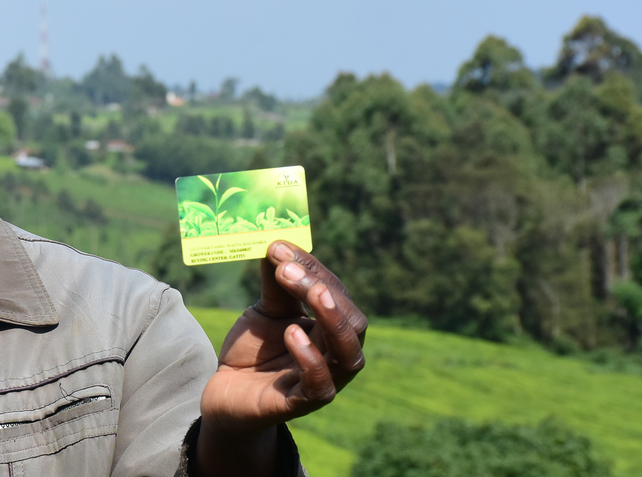Farmer’s Smart Card.
Tea farmers in Kenya are betting on the newly introduced technology in the sector at different collection centres across the country to enable the growers within a short time deliver their produce and submit their details for proper record keeping to ensure they do not incur any losses due to errors which can be avoided.
The new technology which includes the use of an Electronic Weighing Solution (EWS) launched in 2011 and farmers’ Smart Cards introduced last year January by Kenya Tea Development Agency (KTDA) is already a game changer in the sector.
“Before the introduction of EWS and the growers’ smart cards, there were claims of weight falsification by clerks at the tea buying centres. For that reason, in 2007, a tea industry task force recommended the introduction of the new technology to curb weight falsification at collection centres,” read a statement by the KTDA cooperate communication department.
In addition, manual weighing machines which were used required clerks at the tea buying centres to do bookkeeping which was cumbersome at times and often saw some records getting lost as they were in paper-work format.
RELATED CONTENT: KTDA launch cashless system to help farmers keep thieves at bay
On the other hand, the introduction of the smart cards was part of the wider strategy to improve the efficiency of EWS by tightening integrity and ensuring that farmers receive better leaf-collection services.
It has so far increased efficiency at the tea buying centers and provides the farmers with a secure way of storing their data which can be accessed at any time.
The data captured in the card includes farmers’ name, number and the name of the buying center and the factory where they supply their deliveries to.
Apart from market alerts and record notifications, the smart card also helps farmers query total deliveries made without visiting the factory, request advisory on land preparations, fertilizer requirements and secure credit facilities from financial institutions.
RELATED CONTENT: Researchers decry dismal uptake of purple tea

Farmer’s Smart Card.
How the system works
First, EWS has a weighbridge system, a near-field communication (NFC) enabled smart card, a bulk SMS system and an electronic weighing scale which is used to capture the weight of green leaf at the tea buying centres and relay the data to the factory and individual farmer’s database.
The smart card is connected to KTDA Electronic Weighing System (EWS) that has the capacity of sending and receiving SMS to and from the farmers’ phones that they can use to query the system.
At the buying centre, the grower presents the smart card to the clerks who will have to swap it on a machine to capture and store the kilos of green leaf delivered. After the clerk has swapped the card, he or she then returns the card to the grower with a printed receipt.
The card is embedded to the EWS and uses SMS solution to notify tea farmers about the quantities of green leaf delivered at the buying center. This enables them to keep track of their deliveries in real-time.
RELATED CONTENT: Tea tree earns farmers fortunes
Simultaneously, the data captured at the buying centers is also transmitted to the factory, in real time, for record purposes.
The SMS facility in the system can be invoked by KTDA and factories managed by KTDA to communicate with tea farmers, keeping them informed on key events like meetings and trainings.
“The integrity of the EWS and the grower’s smart card has been put to test and has proven 100 per cent secure. It is error-proof, safe and uses the latest device and advanced technology available in the market,” read the statement.
RELATED CONTENT: Purple tea earns Meru farm 10x more in exports
According to KTDA, the second phase of the EWS that includes an electronic weighing scale, a weighbridge system, a near-field communication (NFC) enabled smart card and a bulk SMS system cost every factory about Sh3.8 million.
However, the cards are paid for by the farmers at a cost of Sh100.